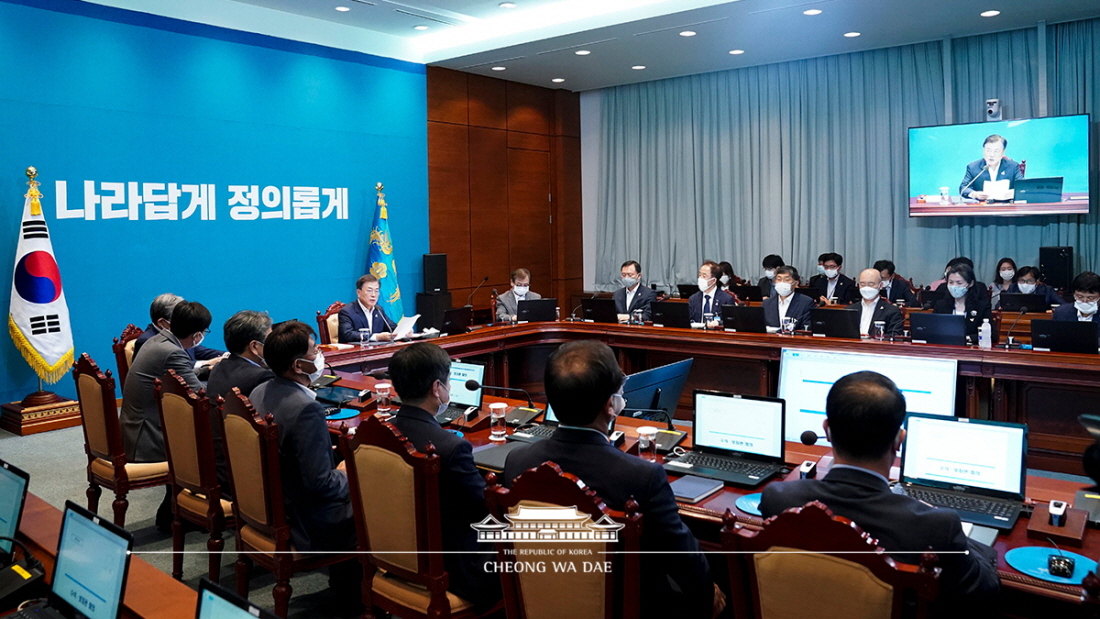이 웹사이트는 제19대 대통령 임기 종료에 따라 대통령기록관이 「대통령기록물 관리에 관한 법률」에 의해 이관받아 서비스하는 대통령기록물입니다. 자료의 열람만 가능하며 수정 · 추가 · 삭제는 불가능합니다.
다만, 「개인정보보호법」에 의하여 개인의 정보를 보호받기 원하시는 분은 관련 내용(요청자, 요청내용, 연락처, 글위치)을 대통령 웹기록물 담당자(044-211-2253)에게 요청해 주시면 신속히 검토하여 조치해 드리겠습니다. 감사합니다.
SPEECHES & REMARKS
BRIEFINGS

Today, we are joined by Chairman Kim Sa-yeol of the Presidential Committee for Balanced National Development and President Kang Hyun-Soo of the Korea Research Institute for Human Settlements. Thank you.
In order to emerge from the severe economic downturns caused by COVID-19, many countries around the world have adopted unprecedented ultra-low interest rates and are expanding the supply of liquidity. Our country, as well, has already seen its market liquidity exceed 3 quadrillion won. Channeling this abundant liquidity into productive areas is the way to strengthen our economy and hasten economic recovery.
The Government must devise all available policy measures to make sure that excess liquidity can flow into sound and productive investments, not into unproductive areas such as real estate.
We must do all we can to ensure that this abundance of liquidity contributes to corporate investment and generates household income. Making money stream into productive areas should be a top policy goal for the moment, and the focus has to be placed on promoting corporate investment and invigorating financial markets in a sound manner.
Today marks exactly six months since the first COVID-19 case was reported in our country, and the daily count for newly confirmed local cases has dropped to four. As this number has been stably managed – hovering around 10 or 20 and proving that our efforts at epidemic prevention amid daily routines have taken root – now is the right time to boost investment vitality. The Government announced the largest-ever fiscal investment plan for a single national project in its push for the Korean New Deal Initiative as the new national development strategy. This shows the Government’s strong determination to lead the Republic of Korea’s great transformation without fail.
However, government fiscal spending alone is insufficient. Its effectiveness can be doubled if financial institutions and businesses as well as individuals join in. Instead of relying solely on the state’s fiscal outlays, it’s necessary to implement plans to facilitate a colossal flow of market liquidity into the Korean New Deal projects and share profits together by actively considering the formation of a New Deal Fund that would induce investments from financial institutions and the private sector.
The signature projects that embody the Korean New Deal were selected among those with a far-reaching impact on the private sector in particular. I’m sure that the Korean New Deal will be an attractive investment destination for financial institutions and the private sector. I urge you to draw up multifaceted support measures to promote their participation in the Korean New Deal project. In addition, I ask you to work with the National Assembly to speed up improvements in the system to help eliminate obstacles to expanding private investments.
There is a saying: Even in times of difficulty, investments for the future should never stop. While pushing the Government’s priority of fostering such new industries as biohealth, system semiconductors and future cars, we must accelerate boosting investment vitality to promote the reshoring of domestic companies and attract advanced businesses.
Moreover, we have to expedite the 100-trillion-won investment projects that the Government initially planned this year. They include investments from both the private and public sectors and privately funded infrastructure ventures. We must also actively identify additional areas for investment.
Business ventures and startups constitute the future of the Korean economy and a driving force leading the transition to a digital economy. We have to support business ventures and startups even more aggressively so that innovative ideas from the private sector can lead to productive investments.
The Smart Republic of Korea Fund to be formed this year will start with 1 trillion won and grow to 6 trillion won by 2025. Its launch is a very important endeavor and will boost startups and business ventures suffering from the COVID-19 outbreak. Moreover, we anticipate that the fund will support the growth of the following: non-face-to-face industries in the post-COVID-19 era; the biotech industry with regard to vaccine, treatment, medical equipment and new medicine development; and green business ventures related to green products, alternative energy and upcycling.
Taking it a step further, we must redouble our efforts to create an environment where sufficient market liquidity can flow into highly innovative business ventures. This includes making a swift decision about the introduction of corporate venture capital.
It is preferable that liquid money flow into and strengthen our stock market, instead of go into some unproductive areas. Although the COVID-19 outbreak severely deteriorated our economic conditions, our stock market has defied the expectations of many specialists and shown considerable stability. Active participation in the market by individual investors has provided a huge boost. It has become easier for blue-chip companies to secure financing from the stock market. Among the other positive effects, the instability in our stock market, which used to be excessively swayed by foreign investors, has been significantly reduced.
The main objective of the plan to overhaul taxation on financial transactions, which will be announced today, is to revitalize our stock market. It’s also essential for our people who are going through difficult times due to COVID-19. Even at the expense of a slight decrease in tax revenues, it should be used to bolster investor confidence, for instance, by encouraging small individual investors to make sound investments. Meanwhile, I ask you to review comprehensive policy measures to actively attract long-term investments by providing incentives and other means in order to protect individual investors and enhance the soundness of the capital market.



